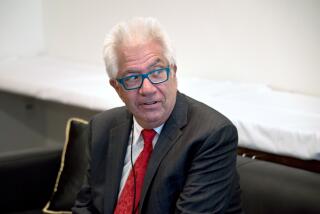James C. Thomson Jr., 70; Led Nieman Foundation
- Share via
James C. Thomson Jr., onetime curator of the Nieman Foundation for Journalism at Harvard University and an Asia expert noted for his early opposition to U.S. policies in Vietnam and China in the 1960s, has died. He was 70.
Thomson, who served as a foreign policy analyst in the Kennedy and Johnson administrations, died Sunday at a hospital in Cambridge, Mass. According to an announcement on the Nieman Foundation Web site, the cause of death was cardiac arrest after a brief illness.
In his 12 years as curator of the Nieman program, Thomson made important contributions in helping open up the admissions policy for fellows to include women, minorities and foreign journalists.
Until he took over in 1972, there had been only 15 women and 11 blacks in the program’s 34-year history. When he left in 1984 there were 51 women and 25 blacks. Thomson also broadened the program to include photographers, an editorial cartoonist and members of the electronic media.
But Thomson also drew criticism during his tenure from some previous Nieman fellows, who believed that his specialty as a foreign policy expert made him too distant from the world of professional journalism.
Thomson was born in Princeton, N.J., but spent much of his early life in Nanking, China, where his father was a chemistry professor and his mother a missionary.
He attended the University of Nanking in 1948-49 and witnessed the climax of the civil war that brought the Communist government to power.
He then enrolled at Yale, where he earned a bachelor’s degree and served as chairman of the Yale Daily News.
He studied at Cambridge University in England, and in 1961 earned a doctoral degree in modern Chinese history at Harvard.
His influence on political policy began in the mid-1950s, when he worked for Democrat Adlai Stevenson in his campaign to deny President Eisenhower a second term.
Thomson would later say that his greatest contribution to the campaign was his coinage of the word “brinkmanship” to describe the Eisenhower administration’s foreign policy, which Thomson believed brought the country to the brink of war in its efforts to stop Soviet expansionism.
While finishing his doctorate, he joined the staff of Rep. Chester Bowles, who was John F. Kennedy’s foreign policy advisor during the 1960 presidential campaign.
With the Kennedy victory, Thomson joined the foreign policy apparatus, working in the State Department’s Far Eastern Bureau.
In 1964, President Johnson’s national security advisor, Mc- George Bundy, tapped Thomson to guide U.S. policy on the lesser-watched nations of Southeast Asia.
But Thomson was critical of the U.S. military escalation in South Vietnam and Washington’s refusal to recognize the Communist government in Beijing. He left government service and took a teaching position at Harvard in 1967.
A year later, he published a harsh indictment of U.S. policy gone awry in Southeast Asia in the Atlantic Monthly. The article--titled “How Could Vietnam Happen?”--won an Overseas Press Club Award for foreign affairs journalism.
Over the next several years, Thomson wrote frequently on foreign policy issues, mostly for newspaper op-ed pages and for magazines.
In 1972, he was named to head the Nieman program, which was established in 1938 by the widow of Lucius Nieman, the founder of the Milwaukee Journal.
The program brings writers and editors--very few of whom were college educated in its early years--to Harvard for a year of study.
According to the Nieman Web site, Thomson told a group of alumni a year later, “Think of me not as a journalist but a journalizer: one who has hovered and nibbled at the fringes of journalism for most of my life. My academic friends think of me as a journalist; my journalist friends think of me as an academic.”
While at Nieman, he enabled the foundation to acquire as its headquarters the Walter Lippman House, a stately Greek revival home on the Harvard campus.
After leaving as Nieman curator in 1984, Thomson taught international relations, history and journalism at Boston University until his retirement in 1997.
His wife, the critic and poet Diana Butler Thomson, who also taught at Harvard, died in 2000.
Thomson is survived by two sisters, Sydney Thomson Brown of Palo Alto and Nancy Waller of Cherry Valley, N.Y.; two stepchildren, Dr. Anne Butler of Brookline, Mass., and Lawrence D. Butler of Ashland, Mass.; and four step-grandchildren.
More to Read
Sign up for Essential California
The most important California stories and recommendations in your inbox every morning.
You may occasionally receive promotional content from the Los Angeles Times.













